Can ChatGPT Write a Book? We Put It to the Test
Helpful Summary
- Overview: This article examines the process of using ChatGPT to write a book and the limitations that go along with this.
- Why you can trust us: We’ve been using (and later building) AI writing tools like ChatGPT for years. And as writers ourselves, we understand the unique challenges and nuances of writing a book with AI.
- Why is this important: ChatGPT is a popular tool, and lots of writers and authors wonder if it’s a good option for writing books.
- Action Points: Use ChatGPT for ideation, but find an AI tool that was designed for creative writing to handle everything else.
- Further research: Head over to our blog for deep dives, tutorials, and comparisons of AI writing tools.
Can ChatGPT Write a Book?
ChatGPT has taken the world by storm. It’s a versatile chatbot that’s great at giving off the impression that it can do anything. But… can it write a book?
If you do a quick Google search, you’ll see a bunch of articles arguing that it can. And beyond that, many argue that ChatGPT is actually a quick way to write and publish books that are good enough to earn you money.
This is a pretty bold claim, and it’s one we’re skeptical of. So, in this DreamGen guide, we put it to the test.
But first…
Why Listen to Us?
At DreamGen, we know how frustrating writer’s block can be. It’s one of the leading reasons why people turn to AI tools like ChatGPT to help them write. Our team has tons of experience using and building AI tools, and we have seen the benefits and pitfalls firsthand.
We are here to share our knowledge and help you make an informed decision about using ChatGPT or other AI tools for your writing needs.
So… Can ChatGPT Write a Book?
We won’t make you read the entire article for the answer. After testing this tool out, our answer to this question is, “Yes, but not a very good one.”
There are just too many limitations standing in the way of ChatGPT for it to be a good tool for end-to-end book writing, including:
- Poor organizational structure for chapters
- Very robotic sounding default tone
- Strict content limitations
- No permanent memory bank
That said, we stand by ChatGPT as a great tool during the ideation stage. It’s a great brainstorming partner since it’s designed to engage in back-and-forth conversations. Want to see how we reached these conclusions?
Read on.
How to Use ChatGPT to Write a Book
1. Ideation
AI chatbots like ChatGPT were basically tailor-made for ideation. So, as you first start to brainstorm your book, ChatGPT is a powerful tool.
Our recommendation? Start jotting down notes about things you might want to write about, like:
- Genre
- Plot point
- Character idea
- Setting
- General vibe
Feel free to get creative here. Then, use the following prompt:
- “Please generate a few story ideas that incorporate the following details: [insert notes].”
ChatGPT really impresses us here. The generations are pretty creative, and it does a great job of working within the creative boundaries you set. Our very specific set of instructions yielded a pretty promising set of options, and ChatGPT even went ahead and included details about the premise and plot.
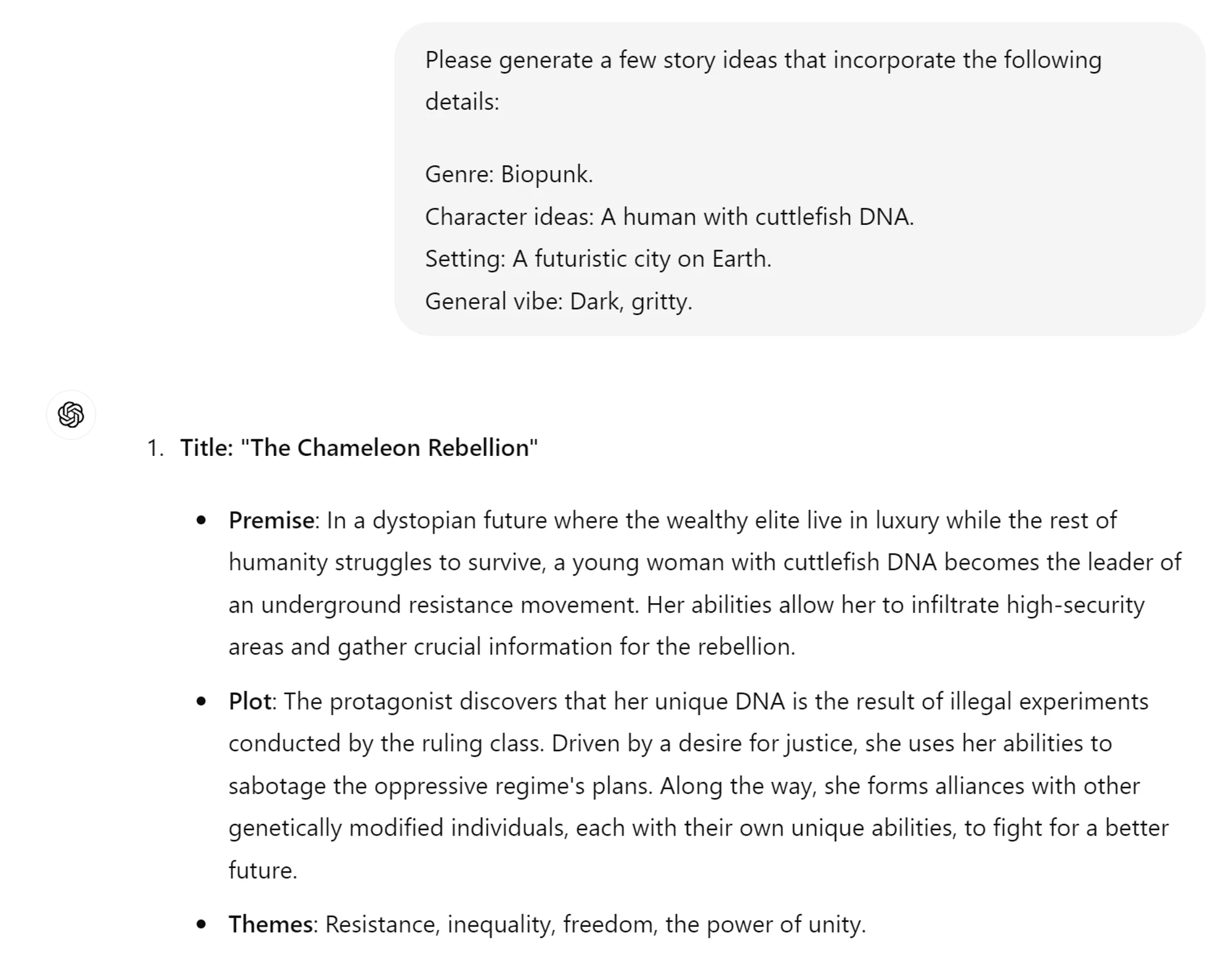
We’ll stick with “The Chameleon Rebellion” for the rest of this guide.
2. Outline Your Book
Another thing ChatGPT is great at? Organizing lots of details into set formats. So, let’s put that to use and get ChatGPT to come up with a potential outline for our story.
Here’s a prompt to try out:
- “Generate a story outline (acts and chapters) for a book about the following: [previous output].”
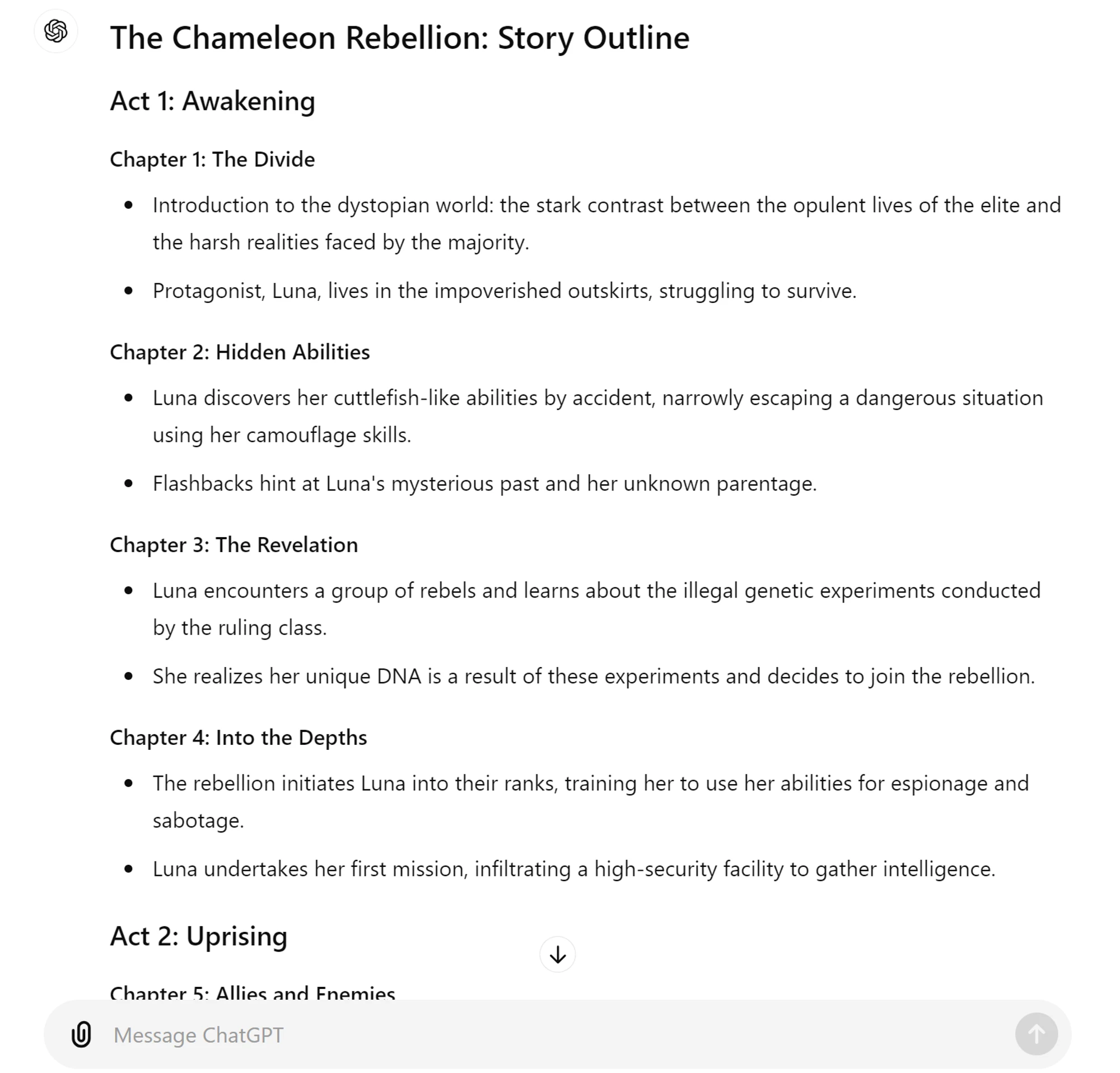
Not bad, ChatGPT.
As you can see, it respected all the details we included in the prompt and managed to spin them into a pretty logical and, dare we say, compelling story outline. With the right characters, this could definitely be a solid sci-fi adventure story.
3. Develop Characters and Settings
Next, we need ChatGPT to make a list of all the characters and settings we want to include in our story.
Use these prompts:
- “Generate a list of all the characters needed to tell the following story: [previous output].
- “Generate a list of all the settings needed to tell the following story: [previous output].”
ChatGPT will probably attach some basic info about each character and setting to this list. So, if you see anything you’re not happy with, you’ll need to correct this manually.
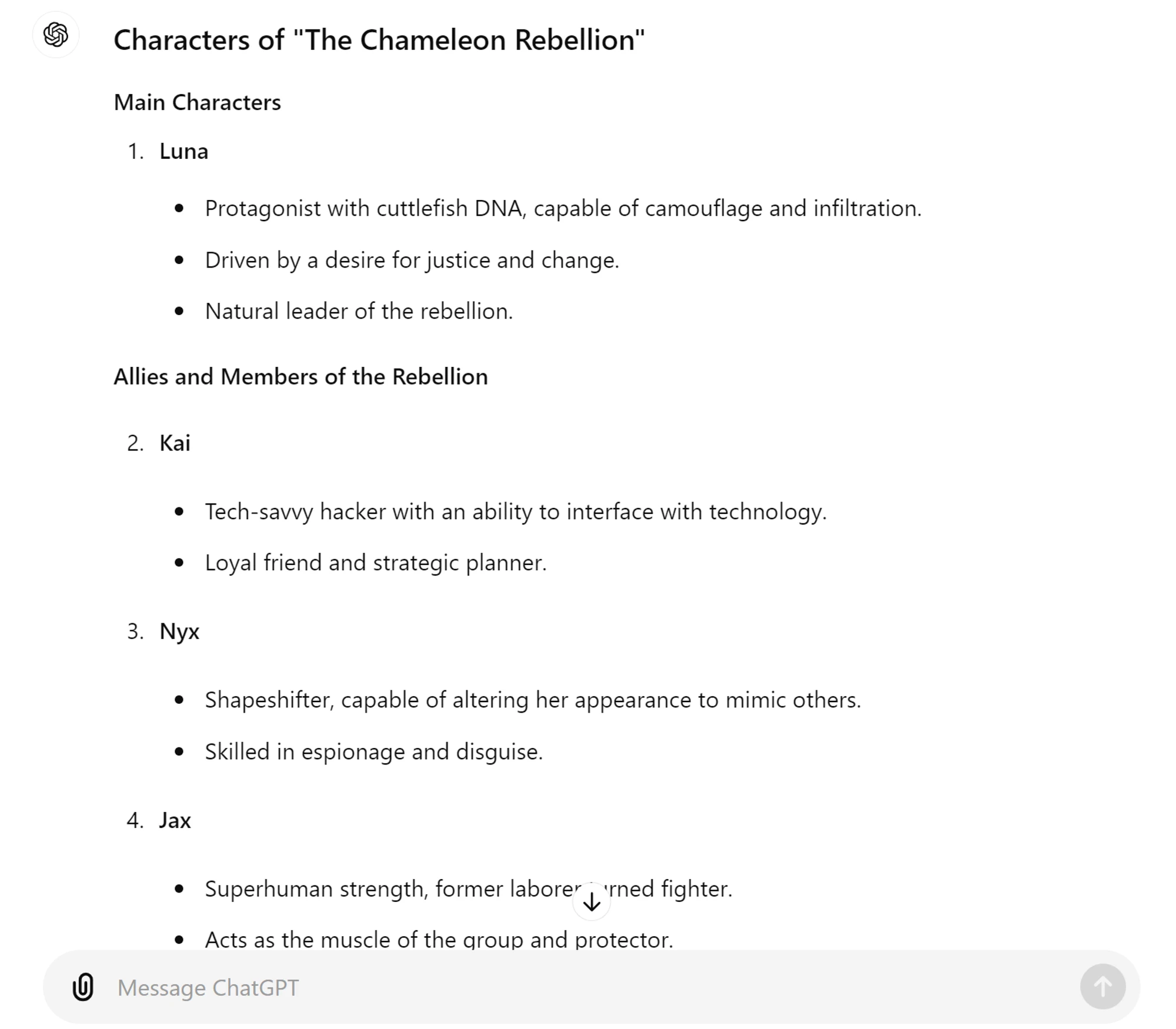
At this time, you should also look for missing characters or settings. If you think of any that you’d like to include, think of a name (or ask ChatGPT to generate one) and explain to the AI how they fit into the story arc—ChatGPT will then make an addition.
Then, we recommend going through each character individually to add depth.
Here’s a prompt:
- “Please create a character sheet for [name]. Include physical description, psychological description, backstory, motivations, relationships, and one line of example dialogue.”
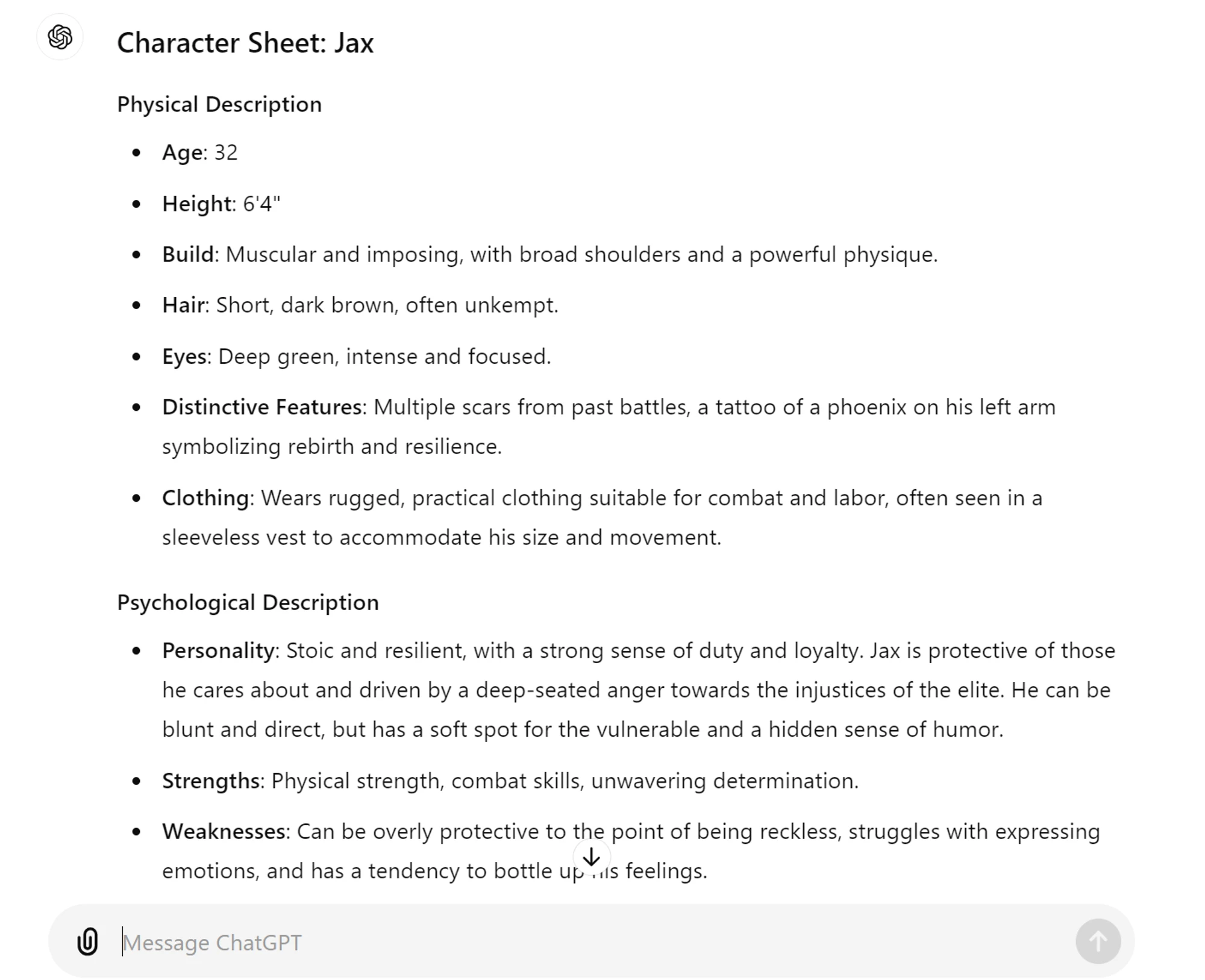
You can do the same for settings with this prompt:
- “Generate a setting sheet for [location]. Include physical description, history, and significance to the story.”
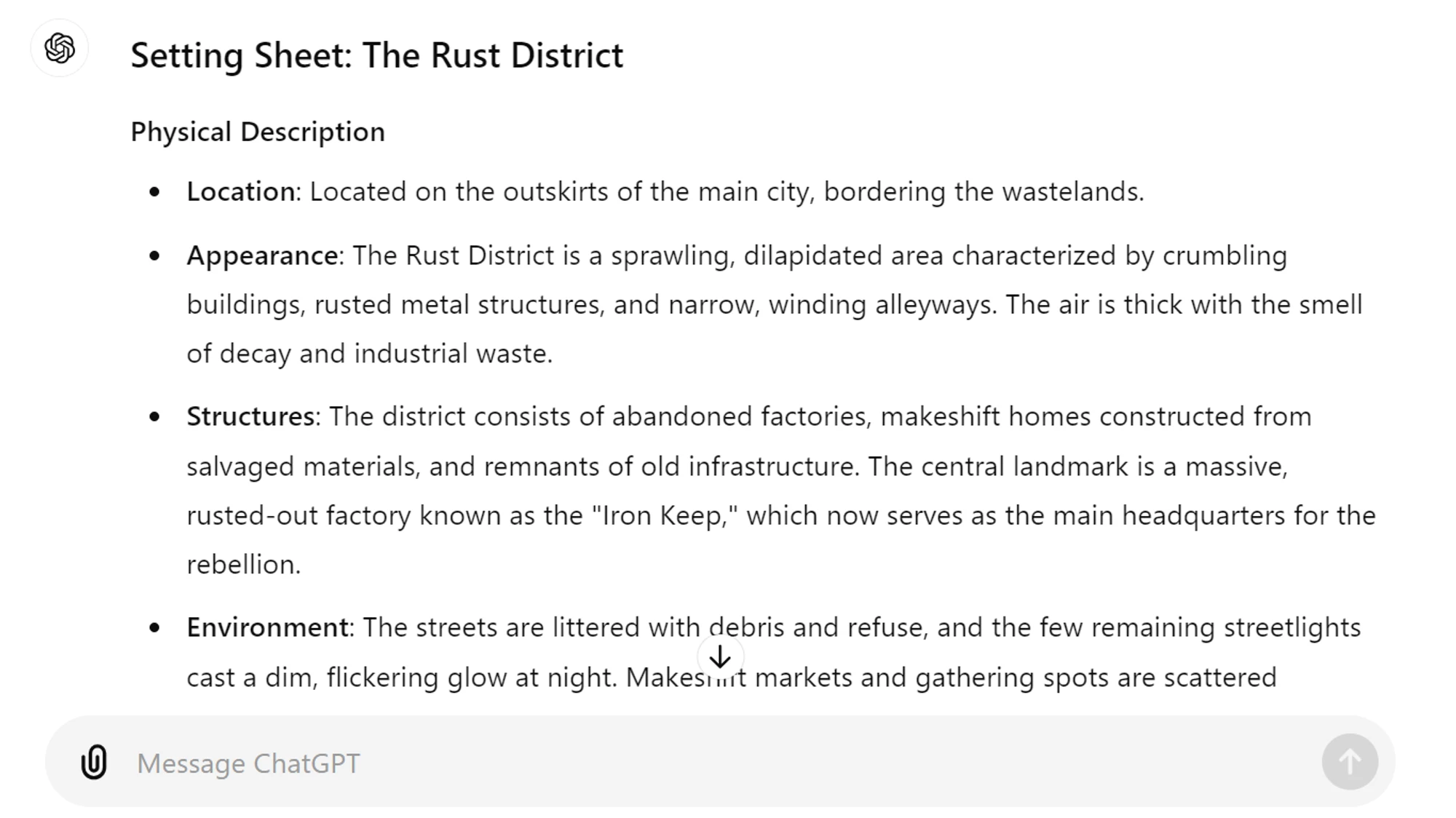
4. Generate Chapters
We’ve done the setup work. Now it’s time to write the book… or at least try to.
There are a few ways to go about this, like generating isolated scenes and then asking ChatGPT to weave them into coherent chapters. But the fastest way is to just ask ChatGPT to generate a full chapter based on the information you’ve established so far.
Here’s a prompt:
- Generate chapter [number] from the following outline:
[outline]
Include the following characters and settings:
[character sheet 1]
[character sheet 2]
[setting sheet 1]
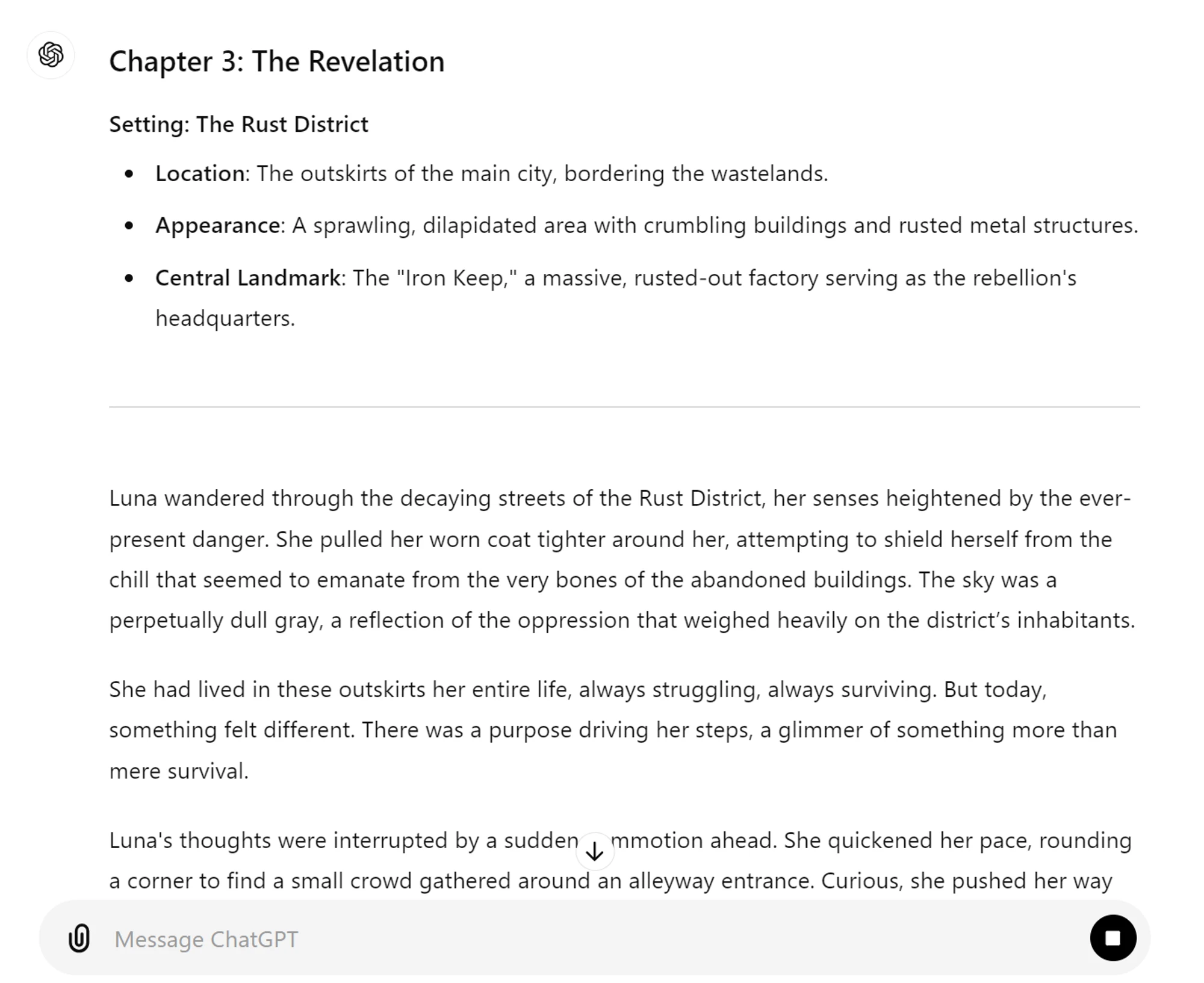
Let’s start with the main positive—ChatGPT does a great job of synthesizing the setup information and coming up with a chapter that fits into your story. Beyond that, there are some pretty major flaws with using ChatGPT to write full chapters like this, including:
Writing Quality
ChatGPT isn’t designed for writing prose. In fact, we’d go as far as to say it’s bad at writing prose. There’s always a distinctly robotic, GPT-esque tone present in the outputs it generates. That’s why AI content detectors are very good at picking up on GPT-generated content.
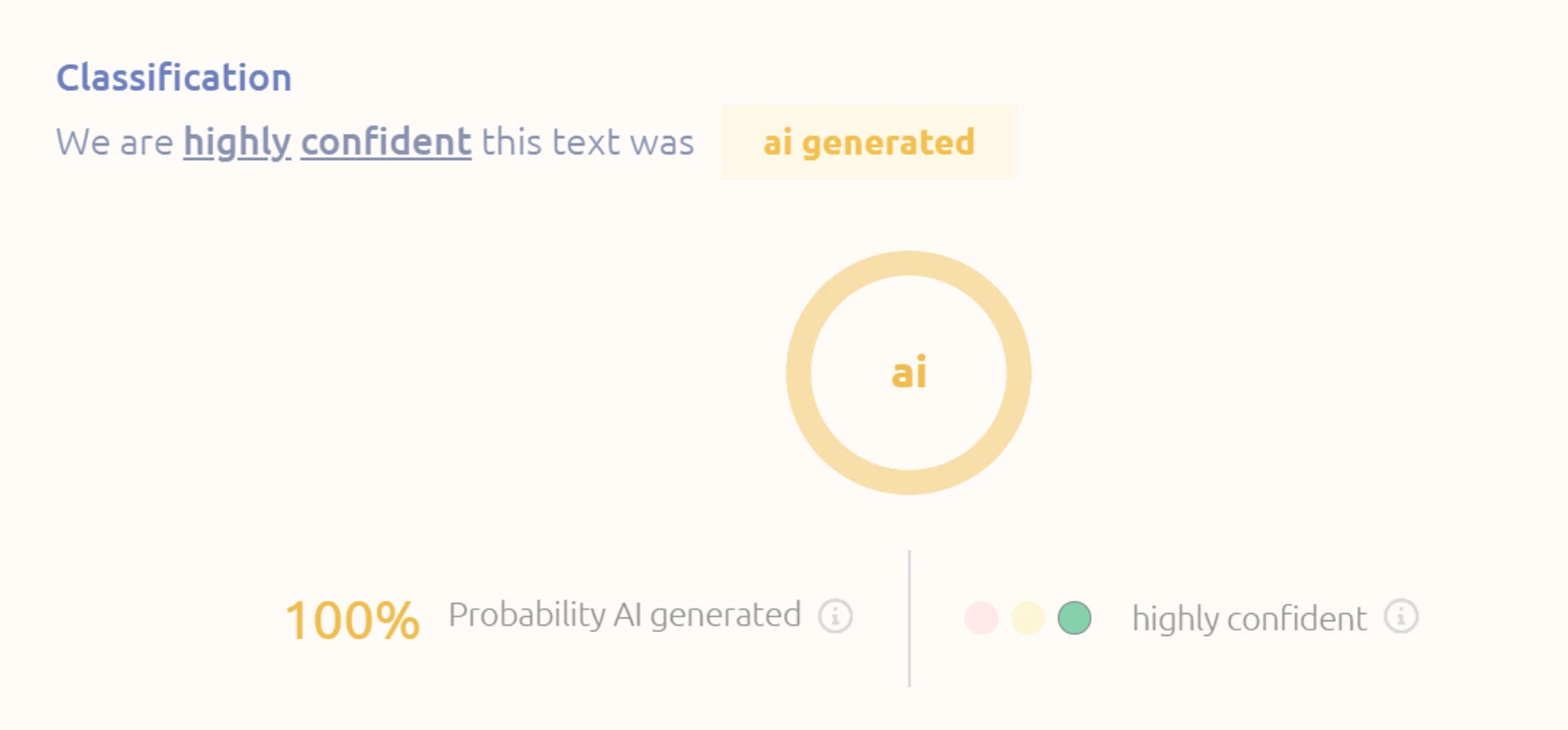
This isn’t a problem in the ideation or planning stages. But it becomes a big problem when it’s actually time to… you know, write. Yes, you can ask ChatGPT to adjust its tone, but these changes are always minimal. Plus, it’s very hard to make them stick over the course of an entire book.
Poor Design
ChatGPT is a chatbot. That means its UI and features are designed like a chatbot. And as any writer will tell you, writing a book tends to happen in something that resembles a word processor (like Google Docs or Microsoft Word) or piece of paper.
With ChatGPT, organizing your book into chapters is almost impossible. You can create separate conversations for each chapter, but then you need to re-explain the entire premise each time.
This brings us to another issue—ChatGPT has no persistent memory system. There’s no way to store information about characters, settings, and items, so ChatGPT always has access. That means whenever your conversations extend past the context window, it’ll instantly forget important details.
With a purpose-built tool like DreamGen? It’s easy—but more on that later.
Content Restrictions
ChatGPT isn’t able to generate any kind of adult content.
That includes:
- Swears
- Violence
- Political talk
- Sexual content
- Drug use
- Non-sexual nudity
If you try to add any of these elements to your story, you’ll get a warning like this.

If you keep trying, you risk getting your account banned. And before you try it, if you write these scenes yourself and then paste them into ChatGPT to have it continue around them… it’s still not allowed. Want to see if you can bypass these restrictions? Check out our guide to making ChatGPT NSFW.
Ethical Considerations
ChatGPT is trained on a vast array of sources. That's awesome for variety, but it also means it might pick up some societal prejudices or stereotypes. You don't want your readers feeling offended because the AI didn't quite get it.
To avoid that, you'll need to be an attentive editor, checking for anything that might raise eyebrows. This process involves identifying and removing any potentially problematic elements that may have slipped through the cracks during generation.
So… Can ChatGPT Write a Book?
After testing this tool out, our answer to this question is, “Yes, but not a very good one.”
There are just too many limitations standing in the way of ChatGPT for it to be a good tool for end-to-end book writing, including:
- Poor organizational structure for chapters
- Very robotic sounding default tone
- Strict content limitations
- No permanent memory bank
That said, we stand by ChatGPT as a great tool during the ideation stage. It’s a great brainstorming partner since it’s designed to engage in back-and-forth conversations.
Best Alternative for Writing a Book: DreamGen
Phew… that’s quite a few limitations. But don’t worry, we have a solution for all the writers and authors out there—DreamGen.
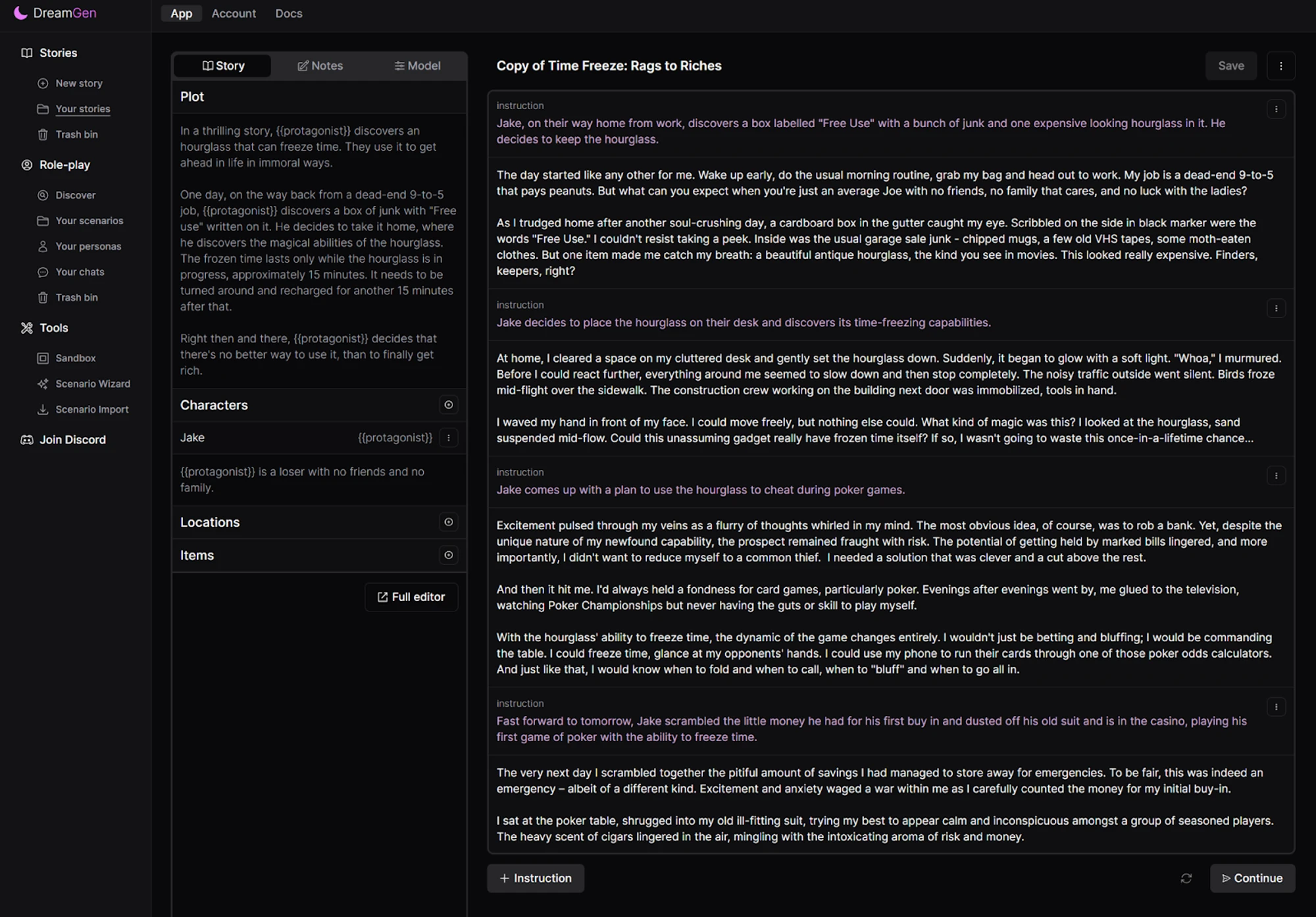
DreamGen is an AI platform that gives writers complete freedom to create long-form stories, books, and fanfics with the help of AI. We developed our own AI models to supper full range of artistic expression, so you can explore any topics or themes you want.
Plus, DreamGen is designed for writing books. Our Story Bible makes it easy to organize items, locations, and characters in a persistent memory bank that our AI can draw from. So you never have to worry about forgetting important details or losing track of your plot.
Core Features
- Role-Play and Story-Writing Modes: Whether you're into creating vibrant stories or immersive role-plays, DreamGen has a mode.
- Open-Source Accessibility: All our models are completely open-source and available on Hugging Face for extra transparency.
- Multi-Character Dynamics: Enjoy complex role-plays with multiple characters interacting with each other independently.
- Scenario Library: Access a library of pre-written scenarios to get a jumpstart on your role-plays and stories.
- Scenario Generator: Do you have a dry spell and need help brainstorming scenario ideas? Do none of the built in scenario strike your fancy? Our scenario generator can help flesh out the plot, characters and more based on your suggestions.
- Deep Settings Menus: Fine-tune AI models, outputs, and more with our in-depth settings menus and customization options.
Bottom Line
AI writing tools like ChatGPT can be a valuable asset for authors struggling with writer's block or world-building. However, this tool isn’t good for writing books—no matter how many articles there are out there claiming it is.
You’re the author, and the AI is there to assist you. With DreamGen, you can harness the power of AI to write your stories without it stealing the show. Get started with a free account today and see what AI creative writing can do for you.